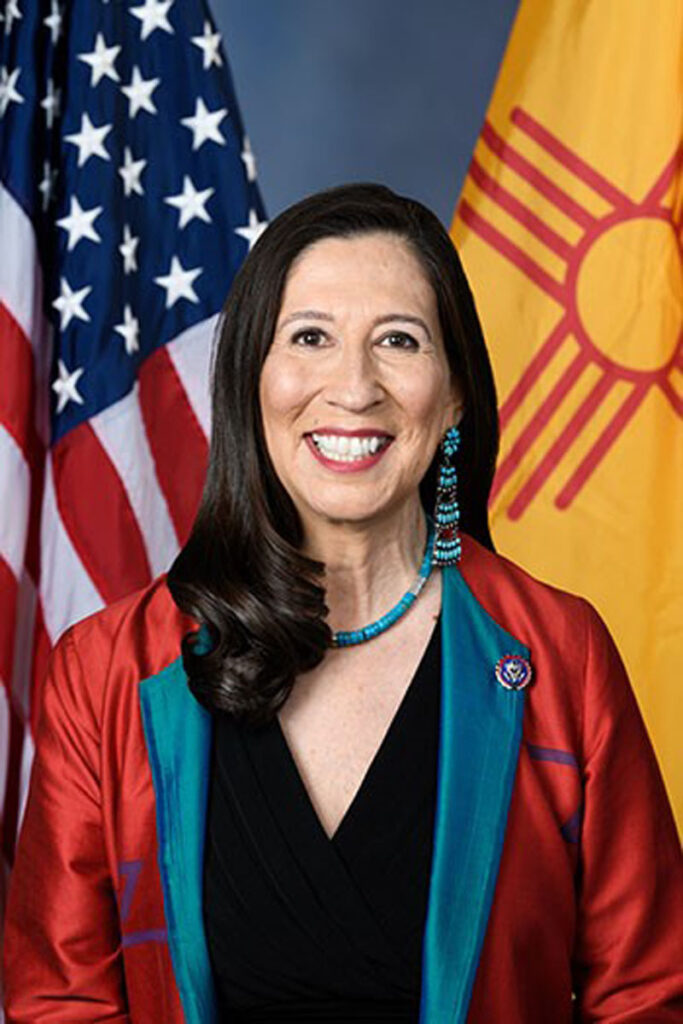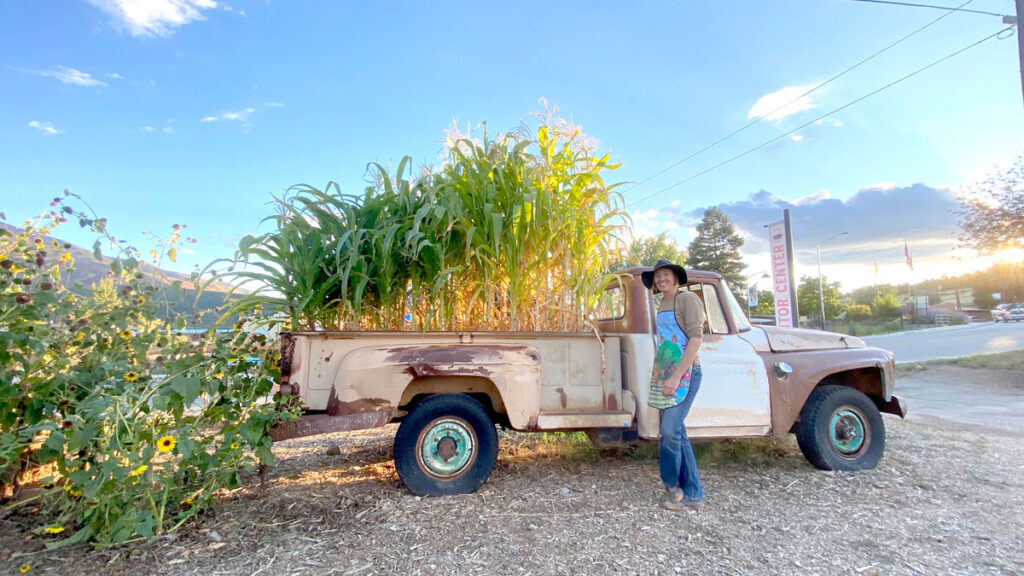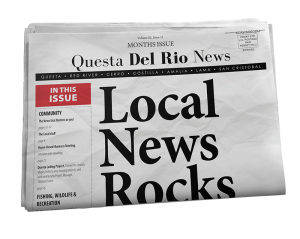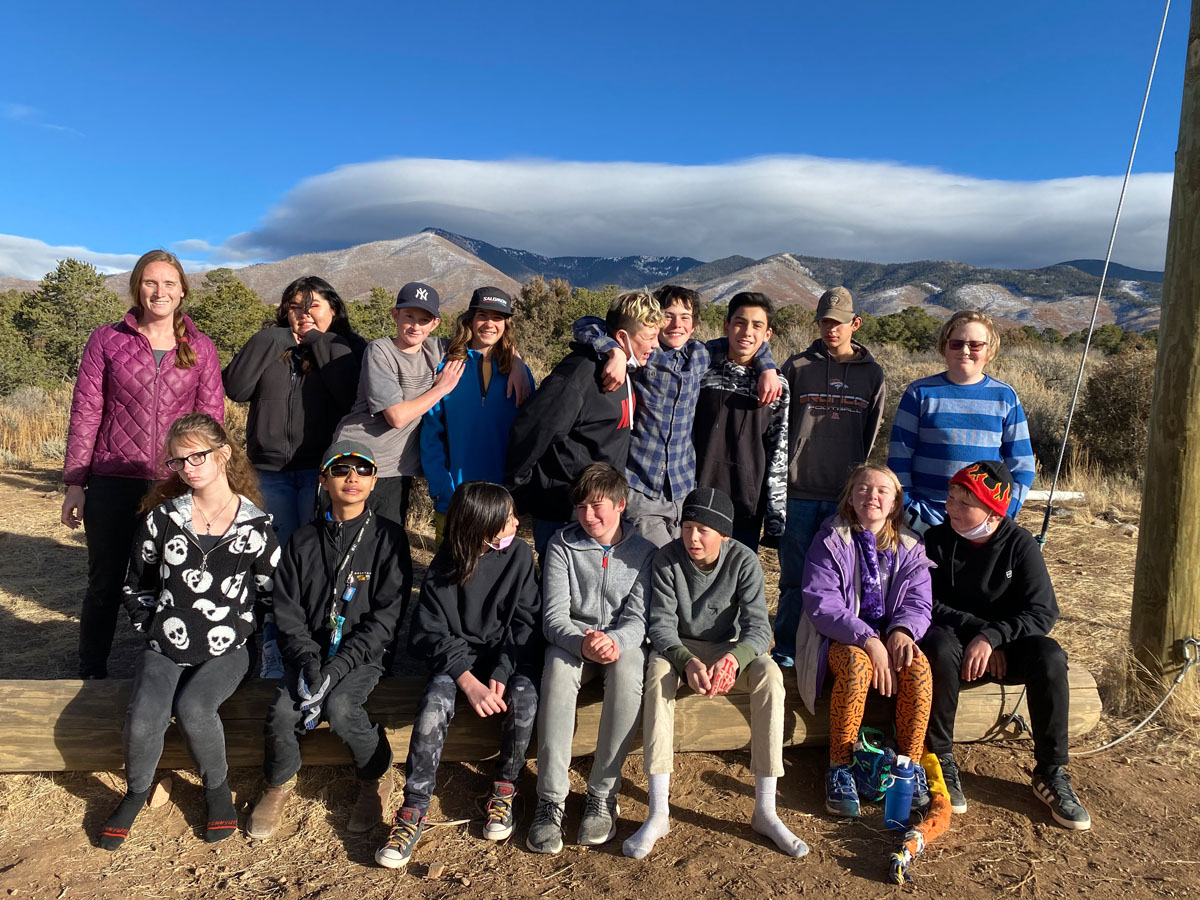A project of Roots and Wings Community School
The following articles were all written by students in grades 6 to 8 at Roots and Wings Community School (RWCS), a free public charter school located in Lama, New Mexico. RWCS is an expeditionary learning-inspired school where, each semester, students complete a product that is related to what they learned—one that is self-directed, rigorous, and has an authentic audience. These products take many forms, from cookbooks to trail guides to crafting and selling distilled oils.
This semester, our middle school students interviewed a variety of individuals who work in the larger agricultural community of northern New Mexico; and from those interviews, they wrote the following articles and designed the newspaper layout and insert you see here. The students crafted their own questions and conducted the interviews entirely independently. With these articles, we hope to highlight the myriad of work being done to improve agriculture in our community and just a few of the people working to make local food more sustainable, just, and equitable for both people and the land. We hope you enjoy the articles our students have worked so hard on.
If you would like to know more about RWCS and expeditionary learning, the school can be reached at (575) 586-2076.
We are currently accepting students for the second semester in both our K-2 and 6-8 classrooms.
(575) 586-2076
Tiana Suazo Provides for her Community
By Bastian Ludwig: Grade 7

Tiana Suazo is the executive director of two years at Red Willow Center in the Taos Pueblo. In the beginning, it was hard being the executive director. But as she learned, it became less of a challenge and more fun working out in the fields.
Tiana went to school for a business degree and expected to start her own business as an artist or a musician. Once she was out of college, she got an internship at the Taos County Economic Development Corporation for marketing. The internship required her to do 10 hours of community service. It was then that she discovered her love for farming. “Some days I’ll be in the farm harvesting and weeding, which are the better days. Then the other days I’ll be in my office, writing grants, doing paperwork, and a bunch of boring employer stuff,” said Tiana.
Red Willow Center primarily serves to supply the Taos Pueblo community. With prices at grocery stores constantly going up, Tiana strives to keep the Red Willow market pricing low. She encourages people to grow some of their own food, not only for the land but also for the health of themselves. “When food prices are constantly going up too. So being here at the Red Willow Center I want to encourage more people in my community to farm and grow food.”
Tiana also shared with me that Red Willow Center runs a youth internship program to help out the community by building up the youth’s work ethic for a real job in the future. “We pay our kids $14 an hour to help and they work maybe about 27 hours a week and they love it.” Red Willow Center also runs its own farmers market. The market doesn’t only sell their own produce; local farmers can also sell their produce at the Red Willow Centers farmers market.
All and all, the Red Willow Center helps out the community with their market, youth internship program, and many other ways. They encourage people to farm for themselves and live a better life. So if you want to do your part and support a local business, next time you visit Taos Pueblo go and check them out!
Judy Torres and the Taos Valley Acequia Association
By Ilan O’Donnell: Grade 8
Judy Torres is the director of the Taos Valley Acequia Association. It was founded in 1989 to educate the people who ask about their water rights and help them manage their acequias. She worked there for two years then left to do a different job then returned for 12 more years and she hasn’t left since. She really enjoys it and she is doing great for northern New Mexican agriculture.
Judy and her association also play a big role in organic food and agriculture. In Taos organic food is very important because it’s very easy to eat unhealthy food so when there’s more options for healthier food options it has better results for the community. Judy has a very positive impact on the community of Taos. I think that we need more people and associations like hers,because while we are in this drought that has been going on for 20+ years we need people who manage the water and how it is used correctly.
Water is very important in northern New Mexico because we are in a drought and have been for 20+ years and it is required to survive to have people who know how to manage water like Judy Torres. She also thinks if they can educate everybody on how to use their water rights and garden, the valley will be more sustainable. She also thinks that it is better for kids to eat fresh vegetables than processed food for lunch at school.
Judy thinks growing food and giving it to kids while they are younger and developing their taste buds so they know what good fresh food tastes like. My dad would always say you need to eat food nine times before you can decide if you like it or not. Also junk food like Cheetos and stuff like that have so much sugar and salt you don’t need to try it cause you get instant flavor that you like but it is not good for you.
Judy Torres is a very nice lady and her organization does great things for the Taos Valley
like managing freshwater, helping bring fresh foods to school, and lots of other things like that. On the other hand you should go check out their website https://www.taosacequias.org/. Remember where you get your food.
With Great Power Comes Great Responsibility
By Will Place: Grade 8

On November 17 I interviewed Representative Teresa Leger Fernandez about her job and how she helps people in New Mexico. She is on the Natural Resources Board, the Public Lands Committee, and is the Chair of the Committee of Indigenous People. I would like to write about an average day but as Representative Fernandez said, “The great and kinda fun thing about my job is there isn’t an average day.” So I will write what she’s doing to help. How is she helping with climate change? How is she helping with water rights? All this and more will be answered in this article.
Some of the unique things that Teresa Leger Fernandez is doing for the US and New Mexico is that she helped get better broadband for the US by asking the people of New Mexico what they wanted, and they wanted broadband or in some cases broadband they never had. Also they wanted better water and wastewater systems. She also went on an Aqua es Vida tour which as Representative Fernandez said, “I also went on Agua es Vida in northern New Mexico because the best way to represent a community is to go and talk to people.” So she has done a lot of unique things to help people all over the US and New Mexico.
Representative Fernandez has always loved to help people. Her parents, both teachers, have always fueled her passion to help people. The first job she had was in the Youth Conservation Corps in which she helped the community. She loves to talk to people and, “In this job I can help people all across the country and in New Mexico.” She also likes that her district is big so she can talk to a lot of people.
She is helping with cleaning up nature by making mining and oil companies clean up their mess, such as protecting the Pecos River from toxic mining spills. The federal governor is forcing the oil and gas companies to clean up. She is also helping with climate change, though she does not support nuclear energy as an in-between from fossil fuels to completely green energy. The mining is dangerous, and the uranium mines can become Superfund sites after they stop mining. At the end of the life of uranium we don’t have good ways to deal with the nuclear waste. So she is helping protect the climate and mother nature.
Teresa also likes New Mexico’s best food debate: what is the best type of Chile: red, green, or Christmas? She said, “You know, I’m a Christmas kind of girl.” She says nothing is better than a good green chile soup on a cold winter day but red chile is great on Frito pies and enchiladas. The only bad thing about her job is plane travel and that DC has no good chile spots. In conclusion, she is passionate about her job and loves helping people, “In this job I can help people all across the country and in New Mexico.”
Making Dreams A Reality
By Xeno Landis: Grade 6
Mercedes Rodriguez works for Taos County Economic Development Corporation. She works at a non-profit in Taos where they work with economic food development. They create programs to help the community with diversification of income and help them create their own business. She has been with the Taos County Economic Development Corporation for 20 years and she’s been the current Executive Director for 2 and a half years.
A usual day starts at 9 am and goes until 7 to 8 pm. Mercedes helps turn your dreams into reality by selling your product at local stores. Mercedes helps you turn your dish into a thing you can sell at the local store. She provides a certified kitchen where you can sell it at a local store, for example Cid’s or Smith’s. While it’s really hard to do the contract with Cid’s or Smith’s, she will help you do the paperwork.
An important part of her job is the Mobile Matanza. The Mobile Matanza is a place where you can kill your cow humanely and they cut it into pieces so you can freeze it. She can also help you with selling the cow for top dollar. She can also help you turn your kale into pesto by helping you process it in her certified kitchen and then you can sell it at a local store.
Her favorite thing to do is to grow the plants and process them at the certified kitchen because she can take them to public schools and give them away. She loves to live in this nice environment with plants and making food and helping people make their dishes. She also likes to be around people since COVID happened.
She thinks her job makes a difference because farmers and ranchers are devoted and committed to finding new ways to grow vegetables. Also she is offering classes helping farmers reach rancher goals to become more sustainable in how they ranch animals and grow crops. COVID has really changed her job because of the social distance. It was really hard on her because she loves to be a hands-on person; she likes to be out in nature and she likes to interact with people.
What I got out of this story is that Mercedes works for the Taos County Economic Development Corporation and she basically helps you make your dish and helps you sell it. Also she helps you with the diversification of income and helps people create their own business. She likes to be outside and hands-on. She does not have the least favorite part of her day. She will help you with making and selling your dish.
Gaea McGahee and the Farmers Market
By Abigail Tucker: Grade 6
Gaea McGahee is the volunteer coordinator of the Questa Farmers Market. She organizes music every Sunday and arranges the vendors that sell there. There are twenty markets during the summer growing season. The farmer’s market business went official when they started accepting food stamps. She tries to recruit food vendors to help the businesses sell food and crafts. Her main job is to organize the Questa Farmer’s Market.

Gaea’s inspiration came from her mom who usually took her to a farmers market when she was younger and she ended up selling bead bugs. There was no place in Questa to meet until the farmers market came. The Questa Farmer’s Market is a storefront for local producers to earn money. Gaea’s job has a lot of different parts. The key thing is interfacing with the vendors. The Farmer’s Market acts as an umbrella, under it are all these people that sell things.
Gaea works with teenagers who want to be farmers market interns. She loves to work with interns. The pandemic started creating interruptions but since the food is local, people can be more secure. She says if you can live locally you can pollute less, in this way the farmers market also helps the environment.
Gaea likes to bake pizza and other foods in the horno she built along with other community members. Also she likes to plant and grow gardens. Her passion grows when she sees growth in the market, she wants to continue doing it. She cares about the local food because it’s all organic and healthy. She likes that people who live in Questa don’t have to drive all the way to Taos to get fresh, local food.
Gaea has to do a lot of work on the computer which is not her favorite part. The Questa Farmers Market started back in 2016 but officially began in 2017. She never does virtual interviews but this one was her first time. She only gets paid for certain parts of running the market, like putting up the fence. Lots of people are interested in the market but they make belts, jewelry, and art, not a lot of food.
I was impressed with Gaea because she gardens and cares about food. She helps the community by getting vendors who want to sell food and other things there. She helps the community by making there be a place to meet instead of driving all the way to Taos. Another way she helps the community is by having the vendors sell food and other things useful for others. I also like that we are both cat people. She plants cat grass for her cats. She told me how you can make catnip tea and how catnip is a part of the mint family.
Megan Boatright Preserves Land In Northern New Mexico
By Dusty Elsasser: Grade 7
I got to interview Megan Boatright. She is the rangeland ecologist for the State Land Office and she has been working as the rangeland ecologist for about five years now. Before she moved to Taos she always loved the outdoors, so she decided to become the rangeland ecologist because there is a lot of outdoor work and traveling.
As the rangeland ecologist she works in the Surface Resources Division. Some days she is reviewing applications or working out in the field. The State Land Office manages over 9 million acres of land. Being the rangeland ecologist she also goes and meets with ranchers to decide what they need to do with the land. She is also in charge of leasing land and taking care of it if the person who leased it needs help. Megan also has the job of leasing mineral land which is the land that is underground; she leases this land to gas companies and more.
As the rangeland ecologist she is helping agriculture by working with the land or with the people to maintain the land for future generations. This helps the land in northern New Mexico by helping the animals and the plants that live on the land so that we have food and other things we need. Some of the other ways this job supports northern New Mexico is that the money that is made off the land goes straight to the beneficiaries, such as schools and hospitals. By helping the land, she is helping everyone by having places to grow crops and graze animals.
Megan’s favorite part of her job is going out and seeing places that a lot of people haven’t seen. Megan also likes meeting new people and working with other associations. Megan’s job helps with food supply by leasing the land so that crops and other things can be grown and stuff. Some of Megan’s least favorite things are sitting at the desk all day and not going outside and doing anything. COVID has also impacted her job a lot, such as not being able to go to the office and talk to people. Being that Megan can’t go to the office, she has been doing a lot of online work.
Megan loves the outdoors so she became the rangeland ecologist so she can help the land and make sure that it is taken care of properly. Being the rangeland ecologist she gets to travel all over the state and work on land in all sorts of different places. In the future, Megan hopes to keep helping the environment to keep it healthy.
Tyler Eshleman for a Better Tomorrow
By Kyla Stow: Grade 8

Tyler Eshleman works for The New Mexico Coalition To Enhance Working Lands. NMCEWL is a coalition of over 65 organizations that work in agriculture, along with policies such as conservation and water. Eshleman described the work as, “Figuring how we build best practices together, in a way that is research-based, is practice-based, is focused on equity and justice… and putting people first.”
Eshleman works 40-hour weeks and splits days between organizations and companies, focusing on what they need support in. This could consist of: field work on farms and ranches, US forestry land, running monitor and evaluation, and conflict transformation. “Some parts of what I do are directly working on testing soil, and pulling together resources that communities can share that directly impact their operation.” A great deal of what he handles is working with Indigenous tribes and peoples on what they have been wronged in, or what they have not been able to express. “It’s really about how do we get everyone back to a space where they feel comfortable… where they can bring their whole selves to communicate about their needs, and whatever it might be to communicate. Or however they want to operate in that community,” said Eshleman.
Long term for Tyler is figuring out how to build trust, to be able to communicate differences when the state has regulations, or when people are not cooperating with one’s interest. “You don’t see immediate results, because that’s building trust and building relationships and that takes a long time. It takes a long time of working within that, navigating and negotiating all the way through that for years before those outcomes actually have positive results on them.” The goal of his work is to help and make people feel heard, and see that they are treated respectfully so that both sides can walk away feeling well in what the end agreement is.
Tyler’s job is essential to the system of how agriculture works. It’s imperative that he is present in the cases he is faced with. Along with this, having fundamental care in this profession is important. In an interview, he shared that he has “a passion for making sure that people can come into a space and be treated with respect” and creating an environment in which healing can occur.
At times keeping things under wraps with his own emotions can be hard. Tyler described times when there were days that he would get so angry with the situations that he encountered, he would even break out in tears. Even though this can be hard, he still pulls through for the people. “When I am doing this professionally, or when I am doing it and I am not the person who is most impacted I feel I have the responsibility to not show up with that anger… When I come into that space I have to put my own feelings aside, and hold the space so that the people who are most impacted; they can cry, they can yell, they can be angry.”
It’s no easy task trying to re-write the wrongs of the past, even more so planning for an unpredictable future. Whether it is working in a field, or trying to solve past traumas, Tyler continues to work each issue with the same effort and passion. He works hard for things to be fair and heard between both parties. “Say how our court system is, someone did something, they are being tried by the state. Not even by the person who is impacted the most. It’s like the state is convicting them or punishing them. This is much more like, everyone had a different experience within this and felt something. How do we make sure everyone feels like justice is being done?”
Preserving Land in Taos County
By Ashton Huck: Grade 8
Today I will be sharing with you some things about Kristina Ortez. She has been working with the Taos Land Trust since April 2014. She also works with the New Mexico House of Representatives and has been working there since January 2021. She loves her jobs as far as I can tell, and Ms. Ortez doesn’t have very many complaints about her job other than she can’t really balance her normal life and her job as much as she wants to.
“My day-to-day is very very different, I always start by opening my email, it’s like the first thing I do,” said Ms. Ortez. But her day was very different when I interviewed her. These are some of the things she was going to do after; she was going to check the budget, make elderberry syrup with a friend, write grants, and try to find money for a water line. As you can see, unexpected things come up as an executive director. “As an executive director you’re kinda in charge of everything.”
She said that the Taos Land Trust works with a lot of entities and that they own Rio Fernando park which has a farm that she works on from time to time. One of the entities they work with is the Native Plant Society. The Native Plant Society grows most of the plants that the Taos Land Trust grows on their farm. After my interview with her she was going to get on a Zoom call with an important person in the New Mexican government. He is in charge of the money, and this call will impact lots of organizations including her own. “That’s an example of where my days kinda overlap where I have legislative stuff,” she said.
“It took me a long time to get to the point where I knew what I wanted to do in my life,” she said. But Kristina knew that she was interested in helping her community. She had mentioned that everything that has happened at the Taos Land Trust isn’t only her ideas, it’s been so many peoples ideas put together to form something amazing. She likes knowing that her farm directly gives food to people that work there, as well as the farmers market. “I really think that helps the community,” and in the end that’s what she always wanted.
Ex-seeding Our Expectations
By Gabriel Chavez: Grade 7

Corilia Ortega lives in Taos, New Mexico, where she works for an organization called Taos Land Link. She graduated with her bachelor’s degree in psychology then went to get her masters. Growing food with her family was always something she enjoyed doing and she has always been interested in agriculture. In 2019 she was accepted into a New Mexico Acequia Association job, but Corilia was having to drive back and forth between Taos and Santa Fe. It was getting difficult for her, so she was able to find a new job at Taos Land Link in early 2020.
Taos Land Link is an organization that supports farmers and landowners who might be struggling or are just interested in agriculture. Helping people in agriculture is something that Corilia finds very important to where we live. Corilia will visit landowners and farmers to see if they need help with their properties or just have simple questions about agriculture.
Taos Land Link builds workshops and helps to create healthy natural soils to help the environment and crops to thrive organically. She believes that helping people prepare for agriculture could help our future. “We help people with their farms and land whether it be getting water rights, what kinds of foods to grow, or just helping them prepare for agriculture.” By making natural soils, taking care of her field, and supporting more and more people with their land, she has impacted the future of farmers, landowners, and people associated with agriculture.
Corilia also owns a field and visits it around four days a week to make sure everything is going the way it’s supposed to. Being a good landowner, she will clean her land and maintain its growth. “I usually go about 4 days a week to my field, I’ll spend from 4:00 to 8:30… two of those days I irrigate… when I’m there I’m weeding, pruning things, and cutting things back.”
Farming and agriculture has become so different these days and not many people are doing it anymore. Corilia believes that teaching people about how to maintain their land or farms could shape a better future for agriculture in New Mexico. “I want my niece and nephew to have a sustainable life when they are older, and that can be done by growing crops and helping with agriculture so we can prepare for our future generations.” Corilia cares very much about her niece and nephew; she wants to work hard so the future generations don’t have to struggle.
Over the years Corilia has been trying her hardest to shape the future of our agriculture. She is trying not to let anyone forget about our ancestors who worked hard for us to be here. “I don’t want people to forget about agriculture, especially where we live and what our ancestors did for us.” From going to school for her degree in psychology to helping and supporting people with land management, Corilia Ortega is on the path of changing our agriculture for many years to come.
Who is Stephanie Garcia?
By Gabriella Ortiz: Grade 7 and Savannah Rusk-Herrera: Grade 6
Stephanie Garcia is the Commissioner of Public Lands.She is the first woman and Latina to ever hold the position. Her job is to make sure the land she is responsible for (over 13,000,000 acres) is well taken care of and is in the proper condition. The part of the land that the state owns she takes care of. The land she cares for is not just empty but has shopping centers, airports, and many more things. She also comes from a ranching background where they would run cattle. She is passionate about farming and ranching because “We are able to eat because of agriculture.”
She takes people to court when they have polluted the land she takes care of, “I make people pay.” When people ruin the land, they take those people to court and make money off of them. The money that they make goes to schools. Most of the land is used by farmers and ranchers. People can use the land that she takes care of by hiking, they could build things on it, and use it for even more stuff. The land she takes care of is used mostly for raising crops and animals. Garcia said, “I feel like it is my job to work for the state that I love.” When asked about a typical day, Commissioner Garcia told us, “No two days are the same.”
Garcia is a politician and has been a politician for 10 years but has held her current position as the Commissioner for three years. Stephanie has to be careful of what she says in public so people don’t criticize her. Stephanie gives a lot of speeches to the community and it used to be scary at first but now she is more confident. Everything about herself is public knowledge, and her children see all the stuff about her in the newspaper and on tv and it can be very hard for all of them to deal with the attention. She believes that the difficulties that come with being a politician are worth it to take care of the land she loves.
Stephanie used to be a teacher for 3rd grade but then she wanted to be in public office because she thought it would have more of an impact. Since she has grown up raising cattle and ranching, she knows a lot about what is good and bad for raising cattle. Her dad and her husband were also ranchers and that’s where most of her knowledge of ranching cattle comes from. She cares about local food because she wants the food to be safe for people to eat.
Agriculture has changed for the better in New Mexico because of the things Stephanie does to protect our land.
Stephanie likes to travel but now with the pandemic she has not been able to do much traveling anymore. Even though she has not been able to travel and even though she deals with criticism for being a politician, the one thing that can’t be stopped is her love for the state of New Mexico.
Leonardo the Mayordomo
By Aliyn Dunbar: Grade 7
I got to interview Leonardo Ortiz who lives in Arroyo Hondo, NM. His main job is a mayordomo and he controls the Madre De Llano Acequia. When he was a kid, he also helped out with ranching, and now he has his own garden that he tends to.
As a mayordomo you have to control the flow of the water so if someone lives near an acequia and they need water Leonardo would make it flow their way. “The only thing that doesn’t need water is rocks and that’s why we have acequias, to help things grow” he specifically said. He also helps build acequias which require a path to be dug and is very difficult work that can take up to a year to build. He also upkeeps them which involves cleaning them of dead animals, leaves, and other debris. An everyday thing for Leonardo would be watering his garden and planting, in addition to controlling the acequias.
By controlling the water he is helping agriculture by getting people the water they need. Ranching helps agriculture by helping animals and giving them a safe habitat and the resources they need to survive and repopulate. Leonardo also said “Ranching helps the environment because the animals eat the dry grass which helps stop wildfires.” Ranching provides carbon that helps purify the air, and helps the soil around where the animals graze so you can grow better in that area.
Leonardo loves his job as a mayordomo because he gets to help people by getting them the water they need for their gardens and things like that. He also said “I wanted to be a mayordomo because controlling the water, and working in the ditch is in my blood.” When he was a kid he was kind of forced into ranching and that made it very hard and boring but now he is doing it on his own time. When he’s not doing what he loves, he is gardening and growing food for his family and himself, and he wouldn’t have any other way.
Interviewing Tony Valdez
By Koda Segura: Grade 6 and Aiden Stow: Grade 7
We interviewed Tony Valdez. I asked him what he did and he said he is retired from Cooperative Extension Services. He did education for kids and adults. He is now retired. He retired last year. Now he is a rancher, and does a lot of things with animals. He worked there for 34 years. He loved what he did, he got to help and work with agriculture and he said it made a big change in his life.
He spoke about land grants and how they helped people grow food and be more independent. The NM land grant was in Las Cruces. Then there were universities created for not just rich people. He said that the university works most with agriculture. The university was talking about all the things but it was not going out to people and giving them new information. So they started making Cooperative Extension Services so people can get that information. That’s who he worked for. And adults did not want to adapt to it so that’s when they started 4-H. The kids were good at agriculture so they were teaching their parents. Then the parents realized that the kids were good so they started to adapt to it.
Tony said when he is working all he thinks about is making it better, doing the job that needs to be done at work. He said there are things you need to do to accomplish what you’re doing. One of the things he did in his work for 8-9 years is he took a bull and tested how he eats and grows and looked at genetics and then applied this knowledge to other bulls and other ranchers. Then the ranch started to fall apart because the owner didn’t feel like doing it anymore, but this is an example of what he did with that knowledge. He took it and went to other people and ranchers and gave them that knowledge. He also looked at crop and food production. He said sustainability is a term that came out 30 years ago.
Tony pursued that career because his uncle told him you like it, so do it. So he did it and made a good career out of it. He went to a college and he was pretty good at what he did. He said your job is your life once you get into it.
Tony impressed me all with what he did, he was really good at helping the community. It impressed me that he loved it so much. Most people hate their job but he loved it. He was a really kind and a cool guy. He was better than most people I’ve met who do the same thing.
The whole bull thing was cool because I help with a ranch too. It’s awesome that he worked there for 34 years, crazy that he knew so much about agriculture and animals, even food. It was impressive that he did it all. The whole community is cool with how they help people. It’s funny that the kids were better at it than their parents. I think it’s good that they help the world because people need that, so they can take care of themselves and their animals and everything else they need it for. The whole thing was good in my opinion.




